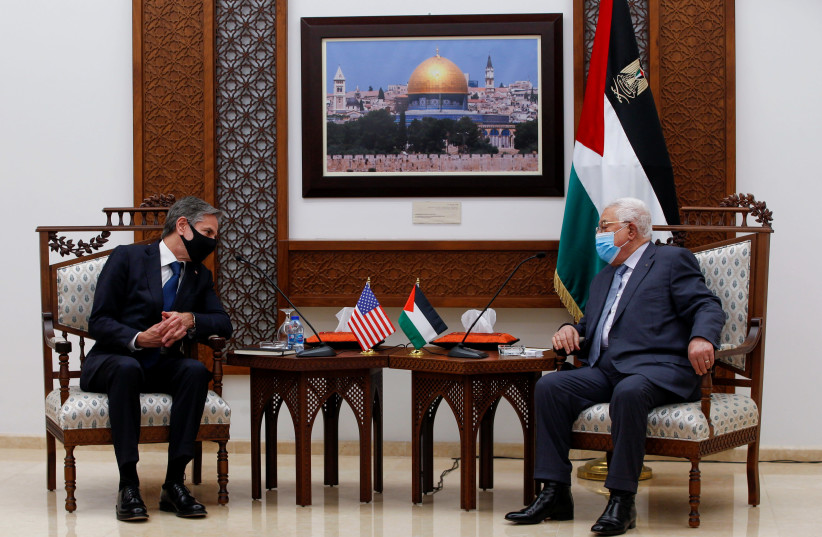Palestinian officials on Saturday expressed satisfaction with US President Joe Biden’s renewed commitment to the two-state solution, but said that they were disappointed that he did not call for an immediate cessation of settlement construction and Israeli “assaults” on Palestinians.
Commenting on Friday’s meeting in Washington between Biden and Prime Minister Naftali Bennett, the officials expressed hope that the president would follow up on his support for the two-state solution by exerting pressure on Israel to abide by international resolutions pertaining to the Israeli-Arab conflict.
Biden did not refer to the two-state solution at all in his public statements during the meeting with Bennett.
A statement issued by the White House after the meeting, however, said that Biden “reaffirmed his view that a negotiated two-state solution is the only viable path to achieving a lasting resolution to the Israeli-Palestinian conflict.”
Biden “underscored the importance of steps to improve the lives of Palestinians and support greater economic opportunities for them,” according to the statement. “He also noted the importance of refraining from actions that could exacerbate tensions, contribute to a sense of unfairness, and undermine efforts to build trust.”
In response, a Palestinian official in Ramallah described the statement as “positive.”
The Palestinians, he said, want the Biden administration to “take real steps to stop Israel from sabotaging efforts to revive the peace process and achieve the two-state solution on the basis of an independent Palestinian state on the 1967 borders, with east Jerusalem as its capital.”
Another official said that while the Palestinian Authority welcomed Biden’s commitment to the two-state solution, “the Americans need to understand that improving the lives of Palestinians is not enough to relaunch a meaningful peace process in the Middle East.”
The Biden administration, he said, must put real pressure on the Israeli government to stop construction in all settlements, including east Jerusalem, if it is serious about resuming the peace negotiations and achieving the two-state solution.
“The Biden administration is talking about confidence-building measures between the Palestinians and Israel,” the official added, “but the actions and rhetoric of the Israeli government are destroying any chance of rebuilding confidence.”

The PLO Executive Committee, the highest executive body of the Palestinian organization, is scheduled to hold a meeting in Ramallah on Tuesday to discuss Palestinian diplomatic steps in response to the policies of the Israeli government, PLO official Wasel Abu Yusef announced.
He said that the meeting, chaired by PA President Mahmoud Abbas, will discuss Palestinian efforts to prosecute Israel at the International Criminal Court for its “crimes,” including settlement construction, house demolitions, killings and threats to evict Palestinian families from their homes in the east Jerusalem neighborhoods of Sheikh Jarrah and Silwan.
Abu Yusef pointed out that the PLO officials will also discuss Abbas’s address to the United Nations General Assembly next month. He called for coordination between the PA, Egypt and Jordan in light of Bennett’s recent remarks regarding the Israeli-Palestinian conflict.
On the eve of his visit to the White House, Bennett told The New York Times that there would be no resolution of the conflict with the Palestinians for the foreseeable future. He said that his government will neither annex any part of the West Bank nor establish a Palestinian state.
Bennett said the government will continue the standard policy of “natural growth” in the settlements, adding that “Jerusalem is the capital of Israel. It is not the capital of other nations.”
His statements drew strong condemnation from the PA, which said that the prime minister has “exposed his anti-peace positions” ahead of his meeting with Biden.
Emad Omar, a Palestinian writer and political analyst, said that the Palestinian issue was absent from the priorities of the agenda of the Biden-Bennett summit.
“The Palestinian issue is witnessing a significant deterioration in light of the absence of elected legitimate institutions for the Palestinian political system, in addition to the state of division and the state of weakness and fragmentation in the Palestinian national liberation parties and movements,” Omar said.
“The current Israeli government cannot provide any political achievement to the Palestinians on the ground, except for some economic measures, especially in the field of goods and the entry of workers and merchants, whether from the West Bank or the Gaza Strip, because it is a weak government and consists of different religious and political orientations,” Omar told the Jordanian newspaper Ad-Dustour.
He called on the leaders of the Palestinian factions to develop a comprehensive national strategy that “restores consideration to the Palestinian cause, based on restoring Fatah unity first, and then restoring Palestinian national unity and holding legislative, presidential and national council elections to revamp the Palestinian political system.”
Omar said that Palestinian unity would allow the Palestinians to mobilize international support for an international peace conference to pressure Israel and force it to withdraw to the pre-1967 lines.
